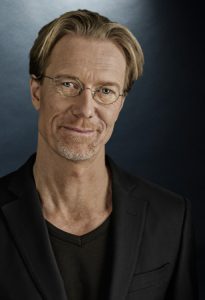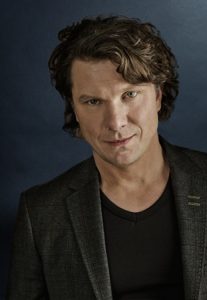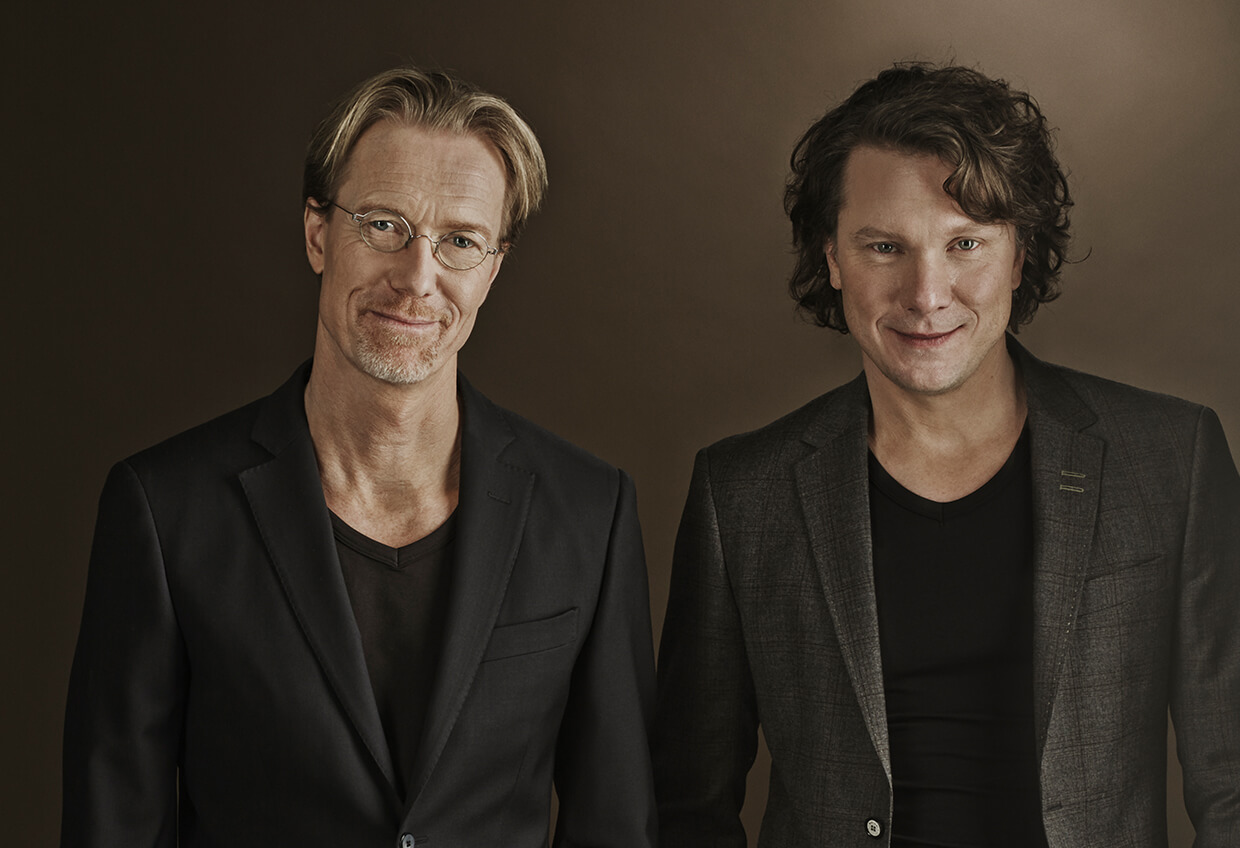Author duo Roslund & Thunberg

Anders Roslund
Anders Roslund is one of the most successful and critically acclaimed Scandinavian crime writers of our time.
Roslund has published Three Hours, Three Days / Knock Knock and Three Years / Sovsågott in his full name, and is also part of the New York Times bestselling author duo Roslund & Hellström, recipients of many prestigious awards, including the CWA International Dagger, The Glass Key and the Swedish Academy of Crime Writers’ Award.
Films and TV-series based on Anders Roslund’s novels are in the works, both in Hollywood and Europe.
Read more about Anders Roslund

Stefan Thunberg
Stefan Thunberg is one of Scandinavia’s most celebrated screenwriters. His body of work spans popular TV-series such as Henning Mankell’s Wallander and Håkan Nesser’s Van Veeteren as well as two of Sweden’s biggest box office successes in recent years: Hamilton and Jägarna 2.
While Thunberg achieved fame as a screenwriter, the rest of his family became infamous in an entirely different way: his father and brothers were Sweden’s most notorious bank robbers, dubbed Militärligan (The Military Gang) by the media.
See all titles from Roslund & Thunberg
Roslund & Thunberg was awarded with Konomys Award for ‘Best Asian Suspense Novel’.
The Writing
Stefan
When I was in my twenties, I was in art school in Stockholm. At the same time, the people who meant the most to me—my three brothers and two of my best friends—were doing something else entirely. They were robbing banks. I never knew exactly which bank my brothers were going to hit next or when they would do it, but knowing that it was going to happen was constantly on my mind. They were family, after all. And because there were no secrets among us brothers, it was possible that I would barge in on them as they were loading their guns in preparation for a robbery or while they were dividing up the goods between them at home afterwards.
I remember the first time it happened. A dark autumn evening. I had just arrived at my big brother’s house. The TV was on in the living room, showing pictures of the armed robbery of an armored vehicle. As I smelled the sour stench of sweat, I could hear my brothers, high on adrenaline, sitting on the sofa and commenting on every detail of the news report.
They were talking about what had happened—how over a few intense minutes, a group of masked men got away with a whole lot of money by threatening with automatic weapons, firing off their guns—like a scene from a movie. A movie I hadn’t seen.
I felt like an outsider. They had crossed a boundary together, and I just sat there next to them listening to them talk.
They took out an empty goldfish bowl and stuffed all of the bills into it. I remember thinking that a million Swedish crowns doesn’t really look like that much. And then, in that exact moment, I could feel their disappointment, disappointment that they hadn’t gotten as much as they had hoped for. Ten million Swedish crowns remained behind a security door that they hadn’t been able to force open, and they’d left it behind along with the two traumatized guards. In that moment it was clear to me that they were going to keep doing this—until either they hit the jackpot or everything fell apart.
And they did. Hitting bank after bank, constantly searching for new targets, making getaways that every time duped the police who tried to come after them. Robbing banks became commonplace. The abnormal became normal. This became clear to me the day my big brother said he wanted to show me something in his guest room.
He removed two big linoleum tiles from the guest room floor and exposed a large safe that had been sunken down and set into the floor. He opened the safe door and I squinted down into its dark interior. Then he went to a junction box on the wall, messed with the wires. I heard a whirring sound and saw how the bottom of the safe slowly lowered, exposing a big hold underneath the floor. It was a secret door that opened to a secret room that my brothers had built. I climbed down a ladder. Looked around. Over two hundred automatic weapons were neatly lined up in tight rows, filling multiple shelves. Weapons from a raid on the Swedish National Defense. Weapons the police didn’t even know were stolen. Yet.
And not even then, when I stood surrounded by hundreds of weapons, or when I sat on the sofa and looked on while the goldfish bowl was filled to the brim with bills, did my big brother say to me, “You can never tell anyone about this.” Because in my family, among us brothers, this was taken completely for granted. This was how we had been raised, taught by my father—you never, ever give up a member of the family.
Again a few weeks later I was heading to my big brother’s house. I was going to take the commuter train from Stockholm’s Central Station but found that it wasn’t running. All public transportation had been stopped; there were blockades and police everywhere. I remember being irritated when I found out that some idiot had put a bomb in one of the storage lockers at the station. What I didn’t yet know, as I stood there in the chaos surrounded by frustrated people and redirected traffic, was that it was my brothers who had made the bomb and placed it there.
Anders
On the other sIde of the police blockdes at Stockholm’s Central Station was…me.
At the very same time.
With a microphone in my hand.
Reporting for Sweden’s largest news program at 7:30 pm about a bombing that later appeared to be a diversionary tactic so that the entire police force of Stockholm would be sent to Central Station—while the members of the most wanted gang carried out yet another bank robbery somewhere else, completely undisturbed.
Sweden was thus faced with a brand new type of crime. The Military Gang, a group of men that did not resemble any other gang of robbers our country had ever seen; a crew that began by committing northern Europe’s biggest raid, that committed the first double robbery—two banks in the same place and during the same time as one—and the first triple robbery—three banks in the same place and the same time as one. This was their philosophy: if the heists were still carried out in exactly three minutes, the risk that the police would arrive in time was certainly not any larger. This gang of robbers exhibited extreme madness, extreme ruthlessness, but also extreme genius in a completely unique combination.
As all of you know, I eventually stopped talking about crime in the form of TV news. I found another form that felt a lot better to me—I began writing suspense, crime novels, thrillers together with Börge Hellström. We were Roslund & Hellström. Entertainment, primarily, but combined with the knowledge of another reality. After fourteen intensive years of writing, we decided to take a break; we had worked so closely and so intensively for so long. I was in the middle of working on my own book, which I later set aside, when I met Stefan. And something happened. A sort of writer’s crush. It wasn’t only that Stefan was such an unbelievably gifted storyteller and stood behind film successes like Jägarna 2 and Hamilton—it wasn’t only that he was the fourth brother, the one who didn’t participate in the gang of bank robbers I myself had reported on—it was simply that we two storytellers had found each other.
And slowly, together, began to approach what Stefan had dealt with, had borne for so long.
Stefan
I didn’t become an artist. I became a scriptwriter and now, I am an author. This is without a doubt the most demanding story I have worked with—but at the same time it’s the one I am most proud of. When I started this project, I knew that I didn’t want to write a documentary novel about me and my brothers, but instead use the genre of fiction so that I could exercise artistic freedom, could emphasize and shape things in order to uncover the emotions in my childhood experiences and during those years when my brothers were robbing banks, so that I could exist in their bodies, in the characters that Anders and I created and that would drive the story forward. Quite simply, I wanted to break reality apart and patch it back together again. Not because the truth is tiresome, but because I had to find the heart of the novel.
When I met Anders, I found that we had the same views on stories in general and on this story in particular. Another thing I discovered was that Anders works constantly. I have never met anyone with Anders’ capacity for work. Yet it never becomes monotonous for him, no matter how much he writes. He writes like a marathon runner who loves every step he takes. I, on the other hand, write more in intervals like a hockey player; I go at it as hard as I can for a short time, then I sit on the bench and rest, then I go at it again. Anders has brought so much to this story with his discipline, experience and talent. And I have learned an unbelievable amount from him. I shared this story with him and together, we made it ours.
Another thing I appreciate is that we are completely in sync in our search for those key scenarios, the ones that won’t release their grip on the reader… like the event that has haunted me for twenty years.
It was December 23, 1993. I heard on the news that four people were on the lam in a snowstorm after having robbed a bank and driving their getaway car into a ditch. Four robbers, one of them in his fifties. And slowly I realized what this meant—though I didn’t understand how it had come to be. That the fourth robber…that he was my dad. That my big brother and my dad had reconciled after years of conflict and decided to do a heist together, the one that would be the Military Gang’s tenth and last. And when I told Anders about this, that father and son united in this chaos, we looked silently at each other and were in complete agreement—this was the heart of the novel.
Anders
It’s a novel. Absolutely. A story. Of course. But sometimes it was very clear that together we needed to leave our fictional world in order to seek out the reality that this fiction was, after all, based on.
On one occasion, we needed to see the whole preliminary investigation. A four-thousand-page police report. After many attempts to track it down, we finally found it in a black garbage bag in a basement storage room. In Stefan’s youngest brother’s basement. I brought the black garbage bag up to my writing den. It was like carrying a human body; heavy, unwieldy. When I got to the den, I emptied it onto the floor. Then it happened. It was as if the black garbage bag really had held a body, as if the smell of a corpse dead twenty years was forced out and funneled straight to Stefan. He was deeply affected by it, became scared and filled with angst, disappeared from our work for a long time. But then he came back—when we were able to recreate a story from the contents of the garbage bag, when we destroyed reality in order to rebuild it as fiction. Extreme madness, extreme ruthlessness, extreme genius.
A gang of criminals that transformed how the banking industry handled money and that everyone throughout the entire investigation assumed was made up of very experienced bank robbers. Either that or mercenaries, because of the violent pattern of the robberies. And then it came out that these were just three brothers and a couple of childhood friends, all in their twenties. Snot-nosed kids without criminal identities or criminal contacts, without any criminal histories at all. And this is why they didn’t think like other gangs of robbers—why when, during a triple robbery, they saw half of their loot dyed red from a dye pack but didn’t give up and throw away the money. They always thought the exact opposite: we’re going to solve this. And they began washing the money, trying one cleaning solution after another, until they found that the most readily accessible of everything they tried, ordinary acetone with water, washed all of the red out of the seemingly destroyed bills. It has been a privilege to work with the fourth brother, who walked around that room, ducking under clothes lines hung with a few million Swedish crowns that dripped on him as the bills were drying. It has been an unsettling journey to encounter the strongest family ties I have ever seen, in both good and evil, to be able to write about what was on the surface just a series of heists but that perhaps actually was a violent father-son showdown.
During the process of writing, Stefan has not infrequently said with a smile, “This is the best book I’ve ever written.” Maybe because it is the only book he has ever written…I’ve published six books and am just as proud of all of them, as happy with Three Seconds as with Box 21. In spite of this, I am now thinking of wording it as Stefan does—this is the best book I’ve ever written.

